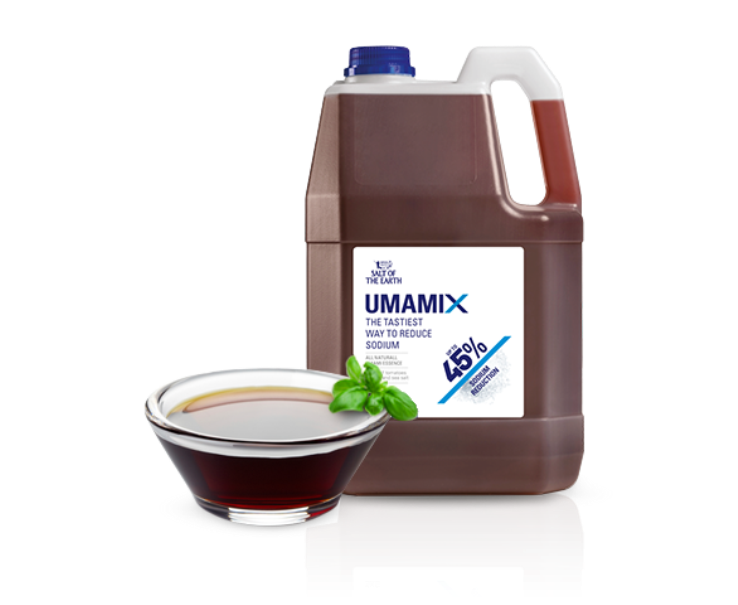How to boost the umami (savory) flavor of foods without MSG and with a minimum of salt is a huge conundrum for food manufacturers, caterers, restaurant chefs and even home cooks.
Israel’s oldest and largest salt company, Salt of the Earth, put three years of research into that puzzle before formally introducing the world to its Umamix product line at the Food Ingredients exhibition in Paris last December.
Derived from Red Sea salt and vegetable concentrates, the product adds an umami profile while significantly reducing sodium.
“Salt reduction is a hot topic in recent years and everybody’s trying to find a solution,” says Dror Levy, food service export manager for Salt of the Earth, based in Atlit near Haifa.
“People are becoming more sophisticated and knowledgeable about the need to consume less salt, and regulation is becoming stricter in the EU, US and Israel in terms of reducing salt and clarifying the labels on processed foods. These two elements brought us to Umamix.”

He explains that umami – the fifth taste along with sweet, sour, salty and bitter — derives from the natural glutamic acid in certain vegetables. Combining these vegetable concentrates with high-quality Red Sea salt gives the umami pop everyone is seeking.
The product line now has four liquid varieties. Umamix for industrial use comes in regular and bold versions for tomato sauces, meat and poultry products, soups and soup mixes, soft cheeses, prepared salads, salad dressings and condiments, snacks and canned tuna.
The regular contains only clear tomato concentrate and natural sea salt from Eilat. Umamix Bold, to be launched formally in the US market at the National Restaurant Association Show in Chicago (May 21-24, 2016), has added seaweed and mushroom concentrates.
For consumers, there’s Mediterranean Umami (regular) and Spicy Mediterranean Umami with added spices and herbs. The company will later introduce a powdered version and perhaps additional liquid varieties. Levy says the Umamix line offers advantages over several other alternatives now on the market.
“It’s a clean-label, vegan, kosher product with no preservatives, non-GMO and 100 percent natural, easily incorporated into any food application,” Levy tells ISRAEL21c. “It enhances tastes while reducing the aggregate amount of sodium up to 45% and helps eliminate the need for monosodium glutamate (MSG).”
35% less sodium in canned tuna
Levy says the Umamix line addresses the disparate goals of three consumer segments.
“The food industry is mostly interested in reducing salt while keeping the original taste profile,” he says. “Professional chefs are interested in enhancing the umami effect, while the salt reduction is a bonus. The end client is interested in both, and especially in natural taste enhancement.”
A survey conducted for Salt of the Earth by MBA graduate students at the Northwestern Kellogg School of Management in Chicago confirms that MSG is a concern for chefs of all levels, and that sodium reduction and taste were key parameters in preparing healthful dishes.
“The chefs used Umamix in their recipes and indicated that it had a dual usage, both as a natural flavor booster and as a sodium-reduction ingredient. Sodium reduction is an important characteristic for chefs and ‘foodies,’ but they will not compromise on good taste,” says Levy.
In a recent trial,Umamix was added to the brine of a leading brand of canned tuna. The sodium level in 100 grams was reduced from about 350 to approximately 250 milligrams (a 35% reduction) without influencing taste and mouthfeel for the 50 participating tasters.
Another trial conducted with a leading processed meat company in Israel showed that replacing salt with Umamix Bold in sausages decreased sodium by up to 30% and actually improved flavor.

In March, the Hilton Tel Aviv’s lobby restaurant became the first major pilot for Umamix Bold, using it in a range of dishes devised by Executive Chef Rafik Jabarin to meet growing demand for low-sodium dishes.
If it is well received, other Hilton properties will be encouraged to try it.
“The objective is always to provide a variety of healthier dishes with lower calorie counts while never compromising on taste and the diner’s enjoyment,” said Jabarin.
“The ultimate test for this initiative will be the response we get from our guests and diners. We feel confident that this will be a positive development to encourage healthier habits in our hotel and eventually our partners across the Hilton community.”
Salt of the Earth has been producing sustainable sea-salt solutions for the global food industry since 1922, says Levy. It sells a wide variety of products to customers in more than 30 countries on five continents.
In response to new UK sodium-reduction regulations targeting 76 categories of foods, Salt of the Earth is working with three major distributors in Scotland and England to provide a consistent, controlled supply of Umamix.
“We are currently working on expanding further in the US and Europe, and we are aiming at the Central American market as well,” says Levy.
For more information, click here.













